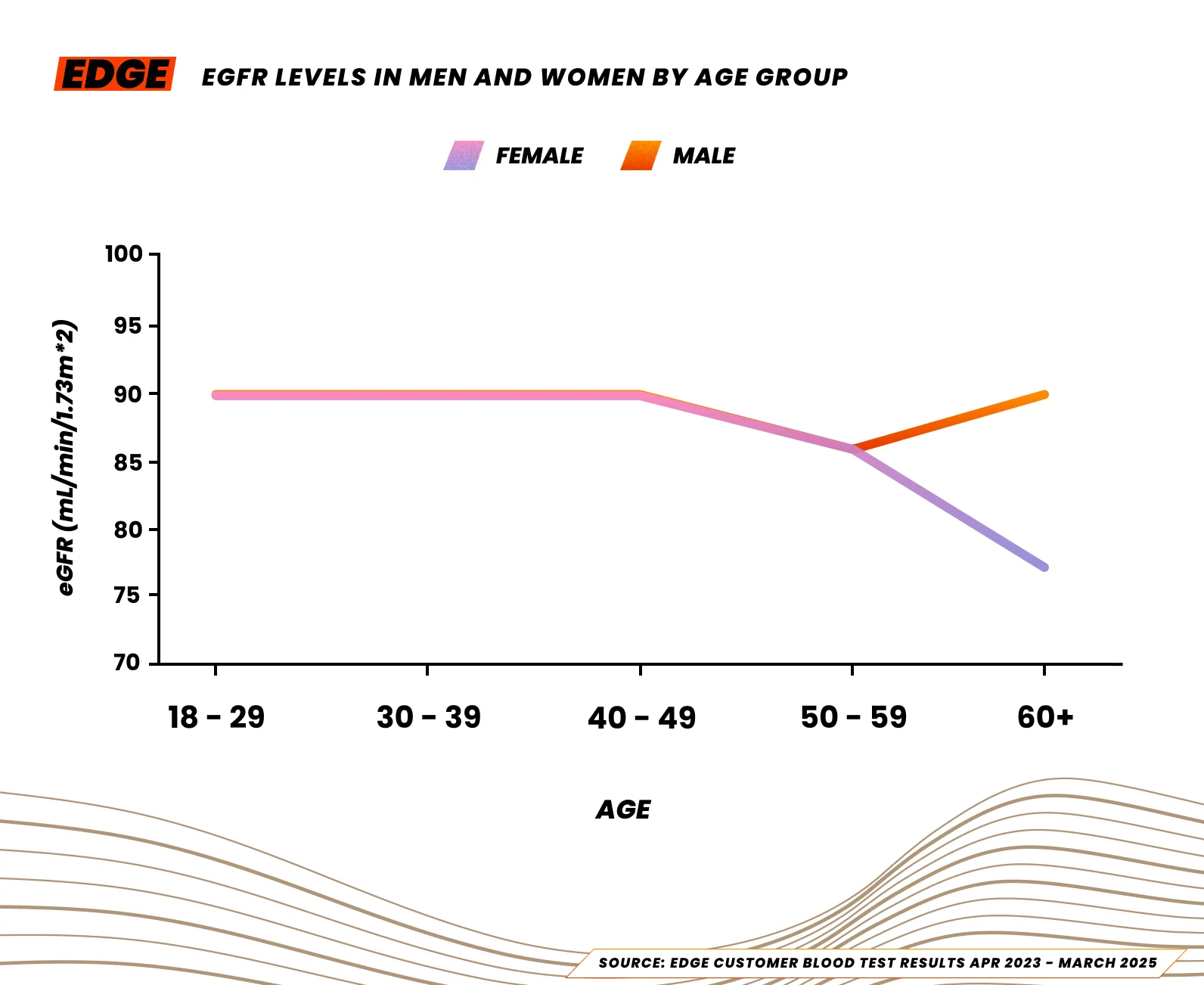What is eGFR & why is it important for athletes?
1 min read
Published on
May 22, 2025
Written by
EDGE
Share this article
What Is eGFR?
eGFR (estimated glomerular filtration rate) measures how well your kidneys are filtering waste from your blood. It’s calculated using creatinine levels, age, sex, and body size — providing a key indicator of kidney function.
For athletes, especially those training at high intensity or using supplements, eGFR helps flag early signs of kidney stress. It’s particularly important when monitoring hydration, recovery, or the impact of prolonged endurance training.

"eGFR (estimated Glomerular Filtration Rate) is a vital marker of kidney function. For athletes, especially those using high-protein diets or supplements, monitoring eGFR helps ensure your kidneys are efficiently clearing waste products. I recommend testing every 6–12 months, and always alongside creatinine to provide an accurate assessment of renal performance under physical stress."
Why Athletes Should Monitor eGFR
-
Kidney Stress from High Training Loads
Intense physical activity increases metabolic waste, placing greater demands on the kidneys. Over time, this can reduce filtering efficiency — especially if combined with dehydration or insufficient recovery.
-
Supplement Use
Protein powders, iPED and non-steroidal anti-inflammatories (NSAIDs) can affect kidney function. eGFR helps ensure these choices aren’t putting undue strain on your system.
-
Hydration Insight
eGFR can drop temporarily if you're dehydrated, useful context during training in heat, long-distance events, or post-competition recovery.
-
Long-Term Health Protection
Repeatedly low eGFR levels may suggest kidney damage. Regular testing enables early intervention to prevent long-term issues.
What are normal eGFR levels for athletes?
We looked at blood test data from EDGE customers and found the median eGFR levels for men and women are 90 mL/min/1.73m*2.
Here is a breakdown of eGFR levels by age and gender:
| Table 1: eGFR Levels in Men and Women by Age Group (mL/min/1.73m*2) | ||
| Age Group | Female | Male |
| 18-29 | 90 | 90 |
| 30-39 | 90 | 90 |
| 40-49 | 90 | 90 |
| 50-59 | 86 | 86 |
| 60+ | 77.5 | 90 |
Source: EDGE customer blood test results Apr 2023 – March 2025.
The labs we used to analyse blood samples state a healthy range for eGFR is between 60-500 mL/min/1.73m*2.

What Affects eGFR in Athletes?
-
Muscle Mass
More muscle leads to higher creatinine levels, which can slightly lower eGFR. This is normal for well-trained individuals, but worth tracking over time.
-
Hydration
Dehydration reduces kidney perfusion, often leading to a temporary drop in eGFR.
-
Protein Intake
These elevate creatinine levels, potentially reducing eGFR readings without indicating actual dysfunction.
-
Age & Sex
eGFR calculations take these into account, so reference ranges are individualised.
When Should Athletes Test eGFR?
-
During periods of high training stress or intense competition
-
When using NSAIDs, iPED or high-protein diets long term
-
If experiencing symptoms like fatigue, muscle cramps, or swelling
-
As part of regular performance health checks
How to Maintain Healthy Kidney Function
-
Stay consistently well-hydrated, especially during training or hot weather
-
Avoid excessive NSAID use
-
Prioritise balanced nutrition and regular rest
-
Don’t ignore signs of overtraining or fatigue
-
Test biomarkers like creatinine, eGFR, and urea together for a full picture
In Summary
-
eGFR reflects kidney filtering efficiency — vital for waste removal and performance recovery
-
Lower levels may point to dehydration, supplement strain, or overtraining
-
Context is key: athletes often have slightly lower eGFR due to muscle mass
-
Regular testing ensures you’re not overlooking kidney stress
Check Your eGFR Levels
Track your eGFR to protect your kidneys, support recovery, and ensure your training isn’t costing you more than it should.
Get 10% off your first order
Want regular tips on how to make the most of your results? Join our newsletter and we'll give you 10% off your order!
Get the knowledge
Get expert advice to help you improve your results.
Go to our knowledge center


